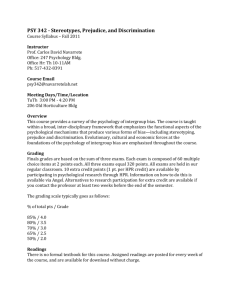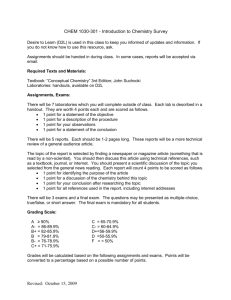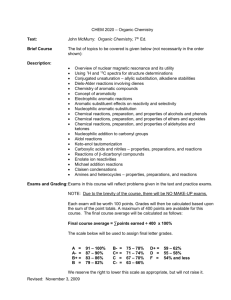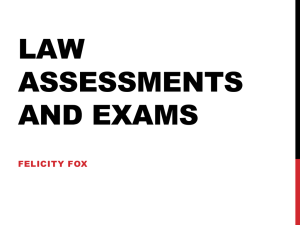PSY 342 - Stereotypes, Prejudice, and Discrimination Course
advertisement
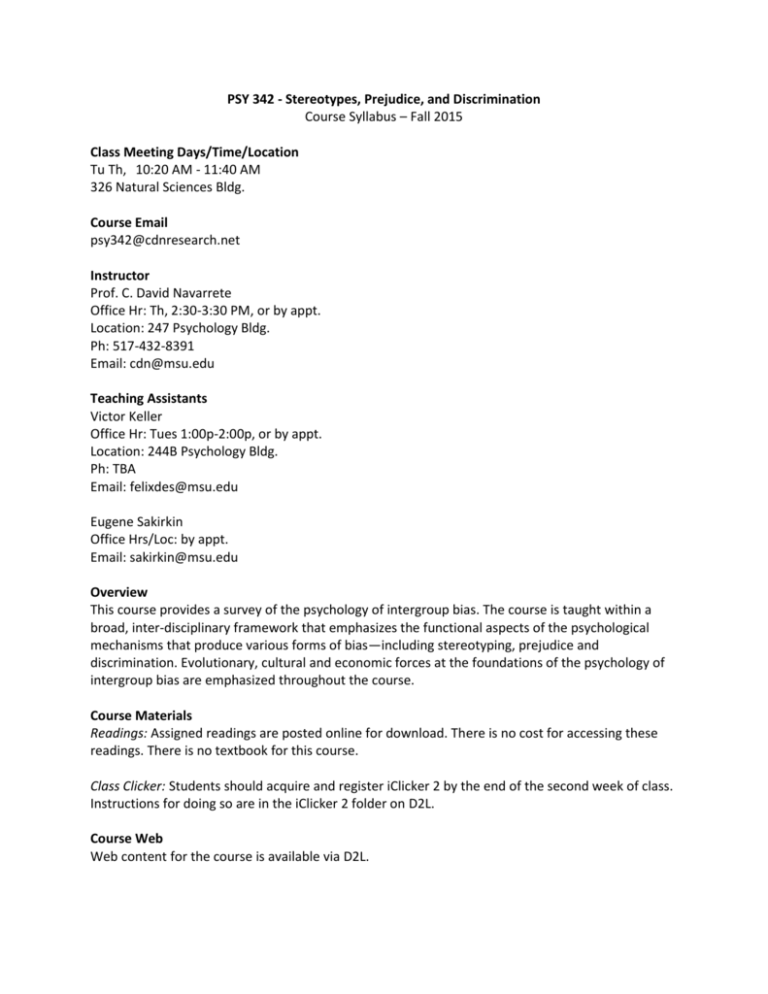
PSY 342 - Stereotypes, Prejudice, and Discrimination Course Syllabus – Fall 2015 Class Meeting Days/Time/Location Tu Th, 10:20 AM - 11:40 AM 326 Natural Sciences Bldg. Course Email psy342@cdnresearch.net Instructor Prof. C. David Navarrete Office Hr: Th, 2:30-3:30 PM, or by appt. Location: 247 Psychology Bldg. Ph: 517-432-8391 Email: cdn@msu.edu Teaching Assistants Victor Keller Office Hr: Tues 1:00p-2:00p, or by appt. Location: 244B Psychology Bldg. Ph: TBA Email: felixdes@msu.edu Eugene Sakirkin Office Hrs/Loc: by appt. Email: sakirkin@msu.edu Overview This course provides a survey of the psychology of intergroup bias. The course is taught within a broad, inter-disciplinary framework that emphasizes the functional aspects of the psychological mechanisms that produce various forms of bias—including stereotyping, prejudice and discrimination. Evolutionary, cultural and economic forces at the foundations of the psychology of intergroup bias are emphasized throughout the course. Course Materials Readings: Assigned readings are posted online for download. There is no cost for accessing these readings. There is no textbook for this course. Class Clicker: Students should acquire and register iClicker 2 by the end of the second week of class. Instructions for doing so are in the iClicker 2 folder on D2L. Course Web Web content for the course is available via D2L. Course Announcements/Updates Announcements are made via email sent through MSU’s online course content system, D2L. Make sure D2L has your up-to-date contact information. Questions and Concerns Questions and concerns should be addressed to the teaching staff at psy342@cdnresearch.net or during office hours. TAs/UAs may answer questions about grading, but final decisions are the responsibility solely of the instructor. Exams and Assignments Exams are in the same room as lectures. The combined point total for all course content is 400 pts., split among the following ways: Exams: There are three 100 pt. exams each composed of 45 multiple-choice (2 pts. each), and two short-essay items (5 pts. each). Exams total 300 pts. (75% of course grade). Class Participation: Participation is registered via iClicker 2 and homework assignments for 100 points total (25% of grade). Make-ups for exams or participation are not typically allowed, but contact me if you have a special circumstance. The point breakdown for assignments, participation and exams is as follows: Type Pts. Each # Pts. Total Homework 6-7 6 40 Clicker Attendance 3 20 60 Exams 100 3 300 Total 400 NOTE: Two absences are allowed before clicker participation points are deducted. D2L will drop the lowest two scores in this category. Grading The grading scale is as follows: Percent Pt. Min. Grade 90% 360 4.0 85% 340 3.5 80% 320 3.0 75% 300 2.5 70% 280 2.0 65% 260 1.5 60% 240 1.0 NOTE: Pt. Min. = Minimum points needed for grade. Meeting Day Exceptions for Online Homework Assignments In lieu of class meetings, lecture content for the following days are posted online. Content will be available a week before it is due. Video lecture assignments are expected to be turned into the appropriately labeled folder in D2L. Due dates for online assignments is 8:00p on the following Tuesdays: 15-Sep, 29-Sep 13-Oct, 27-Oct 10-Nov, 24-Nov Academic Integrity and Conduct Every student is held responsible for knowing the academic integrity policy at MSU. Information regarding this policy is available at: https://www.msu.edu/unit/ombud/dishonestystud.html Students should feel free to voice questions and comments relevant to the course material during lectures, via email or during office hours. Unnecessary chatter during lectures or exams is a distraction and should be avoided. Students should use lecture breaks for conversation. Academic Freedom The instructor and teaching staff are committed to respectful dialogue and professional conduct, and expectations are that students also understand the importance of honest and respectful interaction as well. Most importantly, we are committed to sustaining individual rights for freedom of speech in academic settings. Students are encouraged to make full use this right, and we are committed to engaging a wide range of comments, questions and viewpoints in the classroom or during office hours. For more information regarding individual rights in colleges and universities, visit the Foundation for Individual Rights in Education (FIRE) at https://www.thefire.org Content Schedule (online lecture assignments in bold) Foundations of Intergroup Bias Week 1 Intergroup Bias: Stereotypes, Prejudice and Discrimination Week 2 Origins of Intergroup Bias I: Kin and Kith Week 3 Origins of Intergroup Bias II: Developing Xenophobia Week 4 Social Dominance Theory I: Gender and Power Week 5 Moral Foundations Theory Theories of Intergroup Bias Week 6 Behavioral Immune System Week 7 Implicit Bias Week 8 Social Dominance II: Race and Gender Week 9 Social Identity Theory and Political Psychology Week 10 Moral Communities: Liberals vs. Conservatives The Targets of Bias Week 11 Cliques, Bullies and Mean Girls Week 12 Stereotype Threat Week 13 Achievement and the Burden of “Acting White” Week 14 Reducing Prejudice and Discrimination I Week 15 Reducing Prejudice and Discrimination II Exam Dates Exam 1: Thurs. 1-Oct. Exam 2: Thurs. 5-Nov. Exam 3: Thurs. 10-Dec
